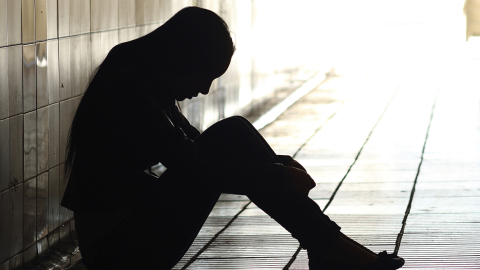Suicide: victimized teens more at risk

A new study published in the Journal of the American Academy of Child and Adolescent Psychiatry (JAACAP) by the team of Dr Marie-Claude Geoffroy, researcher at the CIUSSS de l'Ouest-de-l'Île-de-Montréal (Douglas mental health university institute, McGill group for suicide studies) and the Sainte-Justine hospital research centre, reports that adolescents chronically victimized during two school years at least, are about five times more at risk of thinking about suicide and six times more at risk of attempting suicide at age 15 compared to those who were never victimized.
This is the first study to show a predictive association between victimization, suicidal ideation and suicide attempt in mid-adolescence. In Canada, 7.4% of adolescents aged 14-15 years seriously considered attempting suicide and 3.3% attempted suicide in 2008-2009 according to a study published in the Canadian Medical Association Journal in 2014.
The study used the data from the Quebec Longitudinal Study of Child Development, a general population sample of 1168 children born in 1997-98 in Quebec (Canada) and followed-up until their 15 years.
« The rate of suicidal ideation equals to 11.6 % at age 13 and to 14.7 % at age 15 for the youngs victimized. The suicide attempt rate is 5.4 % at 13 and 6.8 % at 15. In our study, we observed that these rates are much more higher among victimized adolescents compared to those who were not victimized. In the latter case, we rather talk about suicidal ideation rates of 2.7 % at 13 and 4.1 % at 15 and suicide attempt rates of 1.6 % at 13 and 1.9 % at 15 », says Dr Geoffroy.
Peer victimization: a risk factor
Moreover, Dr Geoffroy showed that 13 years old adolescents victimized by their peers have two times more risk of having suicidal ideation two years later and are three times more at risks of suicide attempt. To achieve these results, the study takes into account a variety of factors, including suicidality at age 13, previous mental health problems such as depression, opposition/defiance and inattention/hyperactivity problems, as well as family adversity.
Overall, approximately 20% of the study participants report being exposed to victimization by their peers. Peer victimization includes actions such as being called names, spreading rumours, excluding someone from a group on purpose, attacking someone physically or cyberbullying.
« Although peer victimization predicts suicidal ideation and suicide attempts, it does not necessarily cause it and this prediction does not apply to all individuals, says Marie-Claude Geoffroy. Only a minority of victims will later develop suicidal ideation or make suicide attempt. We do not currently know the reasons why such adverse experience affects individuals and who are the persons more vulnerable to the effects of victimization. »
You may also like
- Towards a better understanding of depression
- Location may be key to effectively controlling pain
- A tiny molecule may help battle depression
Adolescence is a crucial period in regards to suicide prevention. Thus, the authors suggest that effective interventions may require a multidisciplinary effort involving parents, schoolteachers, principals and mental health professionals. All adolescents, victimized or not, who think often and/or seriously about suicide should see a mental health professionals such as a psychiatrist, a psychologist or an accredited psychotherapist.
This work was funded by the Canadian Institutes of Health Research (CIHR) and the Manulife Centre for Breakthroughs in Teen Depression and Suicide Prevention.
About the CIUSSS de l'Ouest-de-l'Île-de-Montréal
The Centre intégré universitaire de santé et de services sociaux (CIUSSS) de l'Ouest-de-l'Île-de-Montréal is made up of the CSSS de l'Ouest-de-l'Île, CSSS de Dorval-Lachine-LaSalle, St. Mary's Hospital, Douglas Mental Health University Institute, West Montreal Readaptation Centre, Grace Dart Extended Care Centre, and Batshaw Youth and Family Centres. It employs 9,000 staff members and 750 physicians.
About the Douglas mental health university institute
The Douglas is a world-class institute affiliated with McGill University and the World Health Organization. It treats people suffering from mental illness and offers them both hope and healing. Its teams of specialists and researchers are constantly increasing scientific knowledge, integrating this knowledge into patient care, and sharing it with the community in order to educate the public and eliminate prejudices surrounding mental health.
Source
Centre intégré universitaire de santé et de services sociaux de l'Ouest-de-l'Île-de-Montréal